BMW i5 Touring vs VW ID.7 Touring - Differences and prices compared
Compare performance (601 HP vs 340 HP), boot space and price (61900 £ vs 47100 £ ) at a glance. Find out which car is the better choice for you – BMW i5 Touring or VW ID.7 Touring?
Costs and Efficiency:
Price and efficiency are key factors when choosing a car – and this is often where the real differences emerge.
VW ID.7 Touring has a evident advantage in terms of price – it starts at 47100 £ , while the BMW i5 Touring costs 61900 £ . That’s a price difference of around 14824 £.
In terms of energy consumption, the advantage goes to the VW ID.7 Touring: with 14 kWh per 100 km, it’s slightly more efficient than the BMW i5 Touring with 15.40 kWh. That’s a difference of about 1.40 kWh.
As for electric range, the VW ID.7 Touring performs a bit better – achieving up to 689 km, about 87 km more than the BMW i5 Touring.
Engine and Performance:
Power, torque and acceleration say a lot about how a car feels on the road. This is where you see which model delivers more driving dynamics.
When it comes to engine power, the BMW i5 Touring has a decisively edge – offering 601 HP compared to 340 HP. That’s roughly 261 HP more horsepower.
In acceleration from 0 to 100 km/h, the BMW i5 Touring is decisively quicker – completing the sprint in 3.90 s, while the VW ID.7 Touring takes 5.50 s. That’s about 1.60 s faster.
In terms of top speed, the BMW i5 Touring performs noticeable better – reaching 230 km/h, while the VW ID.7 Touring tops out at 180 km/h. The difference is around 50 km/h.
There’s also a difference in torque: BMW i5 Touring pulls slightly stronger with 820 Nm compared to 679 Nm. That’s about 141 Nm difference.
Space and Everyday Use:
Cabin size, boot volume and payload all play a role in everyday practicality. Here, comfort and flexibility make the difference.
Both vehicles offer seating for 5 people.
In curb weight, VW ID.7 Touring is slight lighter – 2191 kg compared to 2255 kg. The difference is around 64 kg.
In terms of boot space, the VW ID.7 Touring offers slight more room – 605 L compared to 570 L. That’s a difference of about 35 L.
In maximum load capacity, the VW ID.7 Touring performs slight better – up to 1714 L, which is about 14 L more than the BMW i5 Touring.
When it comes to payload, BMW i5 Touring to a small extent takes the win – 560 kg compared to 465 kg. That’s a difference of about 95 kg.
Who wins the race in the data check?
The BMW i5 Touring sits well ahead of its rival in the objective data comparison.
This result only shows which model scores more points on paper – not which of the two cars feels right for you.
Costs and Consumption
View detailed analysis
Engine and Performance
View detailed analysis
Dimensions and Body
View detailed analysis
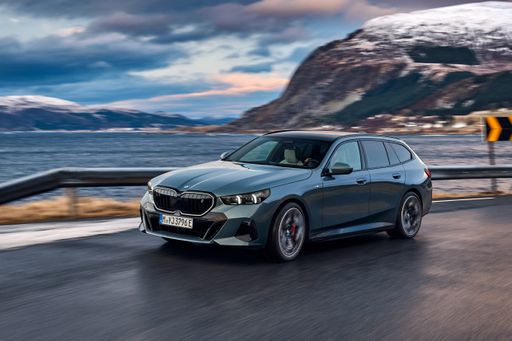
BMW i5 Touring
BMW i5 Touring
The BMW i5 Touring marries the everyday usefulness of a roomy estate with the hushed, premium feel of a modern electric BMW. It’s an appealing choice for buyers who want confident, relaxed driving and executive poise without sacrificing weekend practicality — and it even makes loading skis feel slightly glamorous.
details
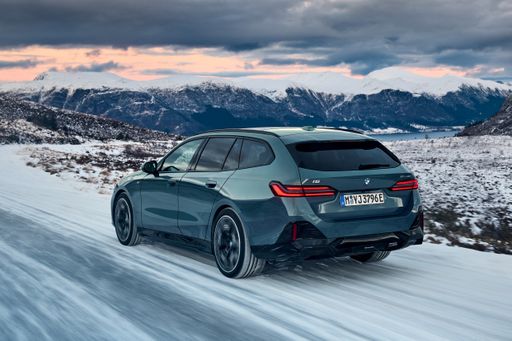
VW ID.7 Touring
The VW ID.7 Touring blends sleek, aerodynamic fastback looks with estate practicality, delivering an electric family car that looks grown-up and feels refined. Inside it's calm and spacious with clever storage and modern tech, swallowing suitcases and weekend plans with ease — a sensible, slightly flashy choice for buyers who want electric comfort without giving up practicality.
details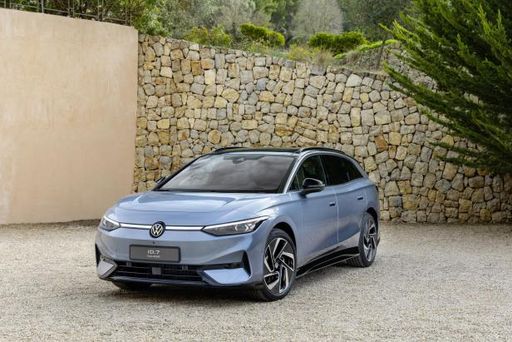
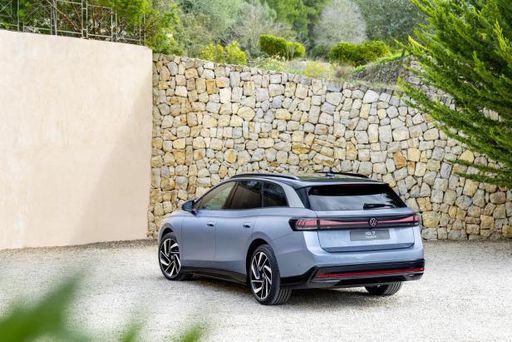
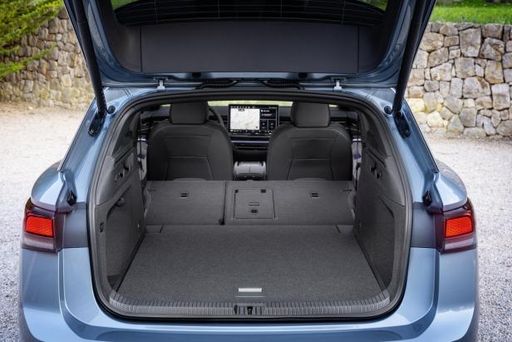
Costs and Consumption |
|
|---|---|
|
Price
61900 - 87000 £
|
Price
47100 - 54900 £
|
|
Consumption L/100km
-
|
Consumption L/100km
-
|
|
Consumption kWh/100km
15.4 - 17.7 kWh
|
Consumption kWh/100km
14 - 16.6 kWh
|
|
Electric Range
522 - 602 km
|
Electric Range
584 - 689 km
|
|
Battery Capacity
81.20 kWh
|
Battery Capacity
77 - 86 kWh
|
|
co2
0 g/km
|
co2
0 g/km
|
|
Fuel tank capacity
-
|
Fuel tank capacity
-
|
Dimensions and Body |
|
|---|---|
|
Body Type
Estate
|
Body Type
Estate
|
|
Seats
5
|
Seats
5
|
|
Doors
4
|
Doors
5
|
|
Curb weight
2255 - 2425 kg
|
Curb weight
2191 - 2336 kg
|
|
Trunk capacity
570 L
|
Trunk capacity
605 L
|
|
Length
5060 mm
|
Length
4961 mm
|
|
Width
1900 mm
|
Width
1862 mm
|
|
Height
1505 - 1515 mm
|
Height
1549 - 1551 mm
|
|
Max trunk capacity
1700 L
|
Max trunk capacity
1714 L
|
|
Payload
535 - 560 kg
|
Payload
459 - 465 kg
|
Engine and Performance |
|
|---|---|
|
Engine Type
Electric
|
Engine Type
Electric
|
|
Transmission
Automatic
|
Transmission
Automatic
|
|
Transmission Detail
Reduction Gearbox
|
Transmission Detail
Reduction Gearbox
|
|
Drive Type
All-Wheel Drive, Rear-Wheel Drive
|
Drive Type
Rear-Wheel Drive, All-Wheel Drive
|
|
Power HP
340 - 601 HP
|
Power HP
286 - 340 HP
|
|
Acceleration 0-100km/h
3.9 - 6.1 s
|
Acceleration 0-100km/h
5.5 - 6.7 s
|
|
Max Speed
193 - 230 km/h
|
Max Speed
180 km/h
|
|
Torque
430 - 820 Nm
|
Torque
545 - 679 Nm
|
|
Number of Cylinders
-
|
Number of Cylinders
-
|
|
Power kW
250 - 442 kW
|
Power kW
210 - 250 kW
|
|
Engine capacity
-
|
Engine capacity
-
|
General |
|
|---|---|
|
Model Year
2024
|
Model Year
2024
|
|
CO2 Efficiency Class
A
|
CO2 Efficiency Class
A
|
|
Brand
BMW
|
Brand
VW
|
Is the BMW i5 Touring offered with different drivetrains?
The BMW i5 Touring is offered with All-Wheel Drive or Rear-Wheel Drive.




